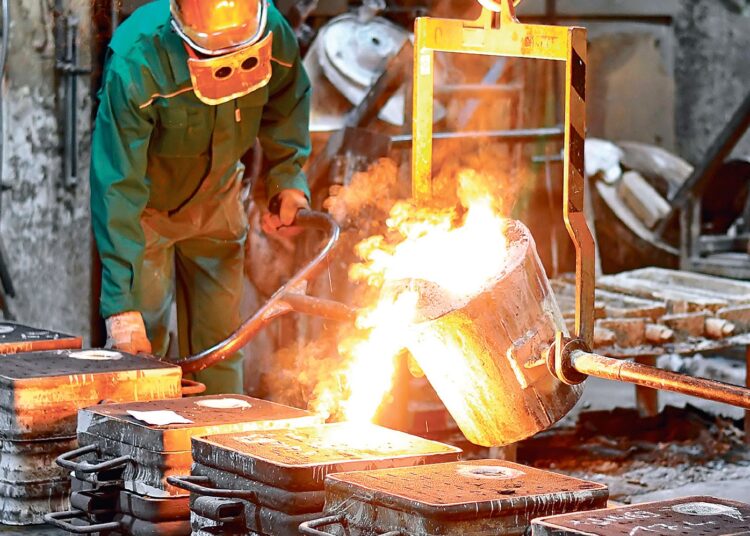Abdullah Bozkurt/Stockholm
Turkish President Recep Tayyip Erdogan has tapped former finance minister Mehmet Şimşek as his new point man to save the troubled Turkish economy and state finances, allay the concerns of international investors and reassure market actors. The move is nothing more than window dressing given Şimşek’s track record in the last decade in sustaining Erdogan’s corrupt regime.
In 2015 Prime Minister Ahmet Davutoğlu also tried the same tactic by enlisting Şimşek on his team, but that did not help much in restoring confidence in the Turkish economy. Everybody knew it was Erdogan who was calling the shots to drive his own populist agenda, with rampant corruption, nepotism, favoritism and crony capitalism.
Şimşek had long ago expended the capital he had earned while working for the Merrill Lynch Emerging EMEA Research Team and as a senior economist at the US Embassy in Ankara before joining the Erdogan government, when Turkey was realigning itself with the European Union through accession negotiations until 2011, with a focus on fiscal discipline, central bank independence and structural reform.
Just like the one-time, reform-oriented Erdogan turned into an authoritarian ruler, Şimşek also transformed himself into a pragmatic politician who often checked to see which way the wind was blowing and adjusting his position accordingly.
In the second decade of Erdogan’s rule, Şimşek either defended or chose to remain complicit in the face Erdogan’s unorthodox economic and financial choices, turned a blind eye when his boss took kickbacks from government contracts and even helped Erdogan’s son Bilal plunder valuable state properties. As finance minister he gifted Turkish intelligence a huge budget with an increase of about 36 percent in 2016 compared to 2015 so that the agency could run dirty operations for Erdogan’s political goals and undermine the opposition with plots and tricks.
In November 2015 he was appointed deputy prime minister and put in charge of the entire economy. He had no problem in running the economy with Erdogan stalwarts such as Naci Ağbal, who was then-minister of finance, Mustafa Elitaş, minister of economy, and Faruk Çelik, minister of customs and trade.
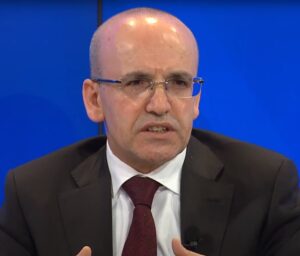
When Erdogan decided to build a lavish palace with over 1,000 rooms for himself in the heart of the capital’s few remaining green spots, it was Şimşek’s finance ministry that bankrolled the construction. He downplayed the cost, claiming that the construction bill stood at 1.4 billion Turkish lira ($615 million at the time), while the Turkish Union of Engineers and Architects Chambers (TMMOB) estimated the total cost at more than 5 billon lira.
Şimşek and all his yes-men had no problem driving Erdogan’s agenda, orchestrating arbitrary tax audits and levying fines on companies that did not align themselves with the government’s political views. He used government instruments as tools of revenge and punishment on the corporate sector to force them to toe the line. He voiced no concern when the Erdogan government unlawfully kept jailing businesspeople who did not support the government.
One of those people was Hazim Sesli, a former president of the Uşak Chamber of Trade and Industry, who was arrested on October 21, 2015 on fabricated charges brought by the government. Only three years before Sesli’s arrest, Şimşek was hailing the businessman for his contribution to the Turkish economy by hiring thousands of people and exporting to 57 countries to contribute to the foreign currency reserves. Sesli was affiliated with the Gülen movement, a group critical of the Erdogan government, and has been imprisoned since then.
He had also worked with Erdogan’s son-in-law Berat Albayrak, the energy minister in the same cabinet. He did not offer his resignation while Albayrak was effectively running the economy and state finances, intervening in Şimşek’s portfolio.
When Şimşek was deputy prime minister, the minister of labor and social security was Süleyman Soylu, an anti-Western and far-right nationalist who was dubbed the “Turkish Escobar” because of his links to organized crime and drug traffickers. Soylu later became minister of interior to provide drug cartels protection from a crackdown by law enforcement agencies in Turkey, a country that has become a cocaine hub in the last decade according to the United Nations.
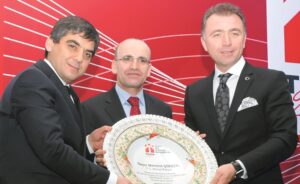
2012 file photo.
Şimşek’s track record shows that he often rushed to the defense of the Erdogan government when it came under fire on various issues. For example in May 2015, when the Erdogan government was accused of wasting hundreds of millions of lira of taxpayers’ money on the purchase of luxury cars for official vehicles, spending 10 times more than the previous year, he said money paid for official cars is “not even peanuts” in the context of the Turkish economy. Turkey was awash with official cars, with their number reaching 130,000 and costing the state TL 8 billion at the time.
Again, when It was revealed in parliament in October 2015 that the treasury had sold a 780,000-square-meter parcel of land to the Erdogan-family-run Foundation of Youth and Education in Turkey (TÜRGEV) for TL 3 million, despite the fact that the market value of the land was TL 606 million at the time. Şimşek, the then-finance minister, defended the sale.
TÜRGEV is effectively run by Bilal Erdogan, who was accused of receiving unlawful donations from foreign and domestic sources and was at the center of the December 17, 2013 corruption investigation, which included serious allegations of bribery and irregularities within the foundation. Erdogan killed the probe of the foundation and saved his son from criminal charges by removing police, prosecutors and judges who were involved in pursing the case. TÜRGEV’s main mission is to staff government positions with political Islamists by inculcating young people with jihadist views.
Şimşek had stayed in the government during the years when Erdogan had pressured the management of the Central Bank of Turkey, accusing them of pursuing not only a wrong monetary policy but a policy opposing national interests, and told them to make radical cuts in interest rates.
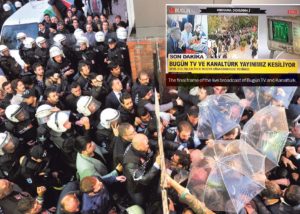
As finance minister, Şimşek was also in charge of the Financial Crimes Investigation Board (MASAK), a unit that was included in his portfolio. Although MASAK discovered a secret money laundering network used by operatives such as Turkish-Iranian national Reza Zarrab in illegally moving Iranian state funds, Şimşek did not act on the intelligence provided by MASAK. He turned a blind eye to the allegations until prosecutors charged Zarrab with multiple crimes including bribing government ministers with whom Şimşek served.
After the corruption probe was made public, Şimşek was one of those who defended Erdogan despite overwhelming evidence of crimes committed by Zarrab and senior government officials. He said the government’s steps to stifle the corruption allegations should be seen as a “temporary mishap or hiccup,” and that once the 2014 elections were over, the government would “get back to basics” vis-a-vis the rule of law. It never happened, and the rule of law was effectively suspended in Turkey in the following years.
Şimşek played a role in this massive roll-back of protection of fundamental rights, the rule of law and democracy. For example, after the corruption probes were made public in December 2013, Şimşek sacked the head of MASAK and other senior investigators who had decades of experience in probing money laundering and terror financing crimes, replacing them with cronies and Erdogan loyalists.
What is more, Şimşek turned MASAK into a political whip for punishing Erdogan critics and helping seize wealthy businesspeople’s assets unlawfully. For example, in 2015, based on a falsified report issued by MASAK, the Erdogan government seized the assets of the government-critical İpek Media Group, the third largest media outlet in Turkey at the time. It was owned by Koza İpek Holding, which was also the owner of two national networks, Kanaltürk and Bugün TV, national dailies Bugün and Millet, one radio station and the English-language news website BGNNews.com. Erdogan went after the group because the media outlet was investigating the government’s links to jihadist groups including the Islamic State in Iraq and Syria (ISIS).
On September 1, 2015 the Bugün newspaper broke a major headline story and published still shots from CCTV video footage that showed a large amount of materials, including explosives, construction pipes, large metal plates and fertilizer ingredients, being transported to ISIS from Turkey’s Akçakale border gate in southeastern Şanlıurfa province while Turkish customs officials stood by and watched. The day the story was published, Erdogan ordered the police to raid the newspaper.
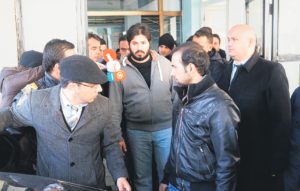
The İpek Media Group was owned by a family conglomerate and run by Akin İpek. The government seized dozens of companies in the conglomerate, falsely charged İpek under terrorism laws, forcing the businessman to flee Turkey and settle in the UK. Turkey requested his extradition, but the UK judge ruled against it, citing a lack of evidence against the businessman.
The crackdown on the independent, critical and opposition media was not limited to the İpek Media Group. Şimşek played a key role in a government-led intimidation campaign against the independent and liberal Taraf newspaper through tax audits. In 2014, after more than two years of inspections, Taraf was fined TL 5.5 million by the Finance Ministry’s Tax Inspection Administration over its scrap paper sales to paper mills. The daily, whose editor-in-chief was prominent author and journalist Ahmet Altan, wrote that other newspapers also engaged in the sale of scrap paper but that Taraf was the only one fined for the practice. When asked about the fine, Şimşek said “those attempts to create a link between the timing of the inspection and political issues are aiming at sedition prior to the elections.”
His personal distaste of critical journalists goes far beyond Turkey’s borders. In May 2014 he was blasted when he asked Kadir Uysaloğlu, the UK representative for Turkey’s best-selling Zaman daily, to leave the Financial Times’ head office in London when he was going to deliver a speech there. Uysaloğlu was invited to cover the event by the Financial Times, but before the session started, Şimşek insisted on the journalist’s removal from the room.
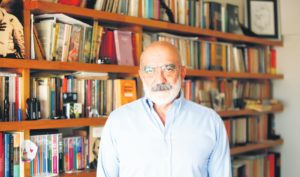
Şimşek is also known for his opposition to sanctions on Iran over the mullah regime’s controversial nuclear program. He hailed the preliminary nuclear deal in July 2015 between Iran and major powers, saying it would boost trade and investment between the two countries. Unsurprisingly, he is sort of a misogynist like the mullahs in Iran. In the past, he blamed women who were seeking jobs for the rising unemployment in Turkey.
Like his boss, Şimşek also favors nepotism as opposed to merit in hiring people for government jobs. One might expect a different approach from him as a Kurd who grew up the youngest of nine children in a poor family in Batman and who managed to get an education that helped him move up the ladder. He moved abroad, obtained both US and UK citizenship and married a US national whom he later divorced. But apparently, he went through a transformation after years in the government working for Erdogan and became corrupted by the power, influence and position.
He brought in his cousin Mehmet Veysi Şimşek, who was a farmer in Batman province, as an unofficial advisor to the Treasury Undersecretariat and later moved him to a senior position as an advisor to the president of the Overseas Turks and Kin Communities Agency, a Turkish government’s diaspora organization. Şimşek’s brother, Selahattin Şimşek, was implicated in a corruption scandal involving the Port of İzmir, but the charges were dropped after the government stepped in to derail the probe.
With such a track record, Şimşek is in no position to repair the damage inflicted on the Turkish economy by the corrupt Erdogan government, which turned the Turkish democracy into an authoritarian regime with a total disregard for the rule of law and fundamental rights and freedoms. He can only help extend the life of Erdogan regime with austerity measures to shore up the finances of the country in the short run. Turkey needs to reinstate the rule of law before restoring the confidence of investors, and Erdogan has no interest whatsoever in doing so.

